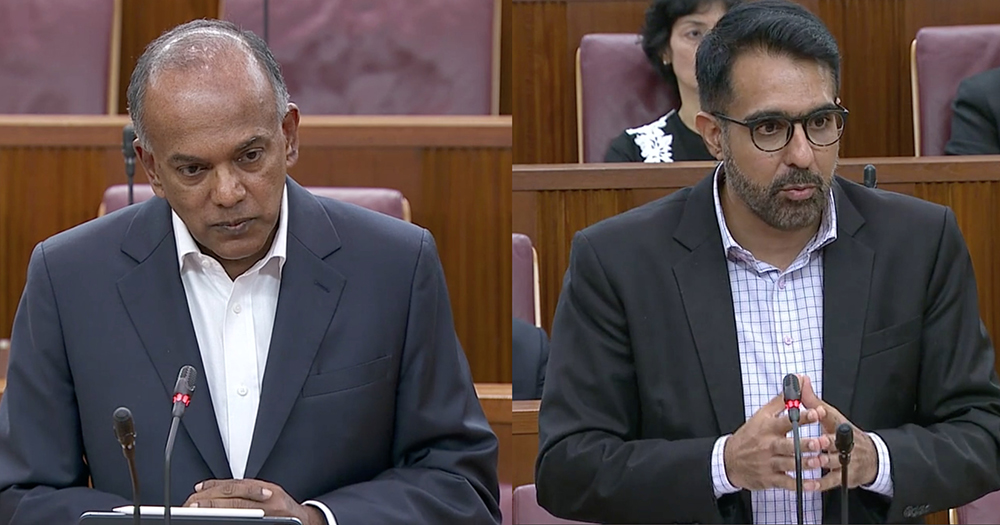If the Protection from Harassment Act (POHA) has provided for the courts to respond swiftly to falsehoods against individuals and corporations, they should be able to do the same for Protection from Online Falsehoods and Manipulation Act (POFMA).
This was the thrust of his speech and other remarks and clarifications made by Workers' Party MP Pritam Singh from May 7 to 8, as part of his party's stance that the Court be made the decision maker, CNA reported (here and here).
Said Pritam on May 7:
"I believe there is scope to introduce processes involving duty judges to deal with an urgent application from the Government speedily or at very short notice."
Decision maker on falsehoods must be free from conflict
In elaborating on his position of why the court should be the arbiter, Pritam stated that the "Executive" -- that is, the decision maker -- on the issue of a falsehood should be free of conflict.
He said that this was because under the Bill, the Executive will act in some cases of falsehoods, while refraining from others.
Pritam added:
"In both scenarios, questions will be asked why the Executive acted as such. Suspicious will be raised and perceptions formed. Politicisation would be inevitable."
He added that it was for these reasons that the decision maker should be be free of conflict in deciding on matters concerning online falsehoods and manipulation as defined by the Bill.
Shanmugam rebuts Pritam, states that a court judgement may not be possible in hours
In response, Home Affairs and Law Minister K Shanmugam stated on May 8, in an exchange with Pritam, that it was not feasible to have the court make a decision in the span of a few hours, both The Straits Times (ST) and CNA reported.
Shanmugam pointed to the process of filing a case as the clearest indicator of how it was unfeasible for a decision to be reached quickly.
"It (the case) will have to be filed. It will have to be served. The defendant may wish to come to court and say ‘I want to argue this’, which means due process. How long do you think it will take to get a duty judge?"
Shanmugam added that in his experience over 22 years, getting a duty judge could take up to two days.
Additionally, if the duty judge is in a hearing, it can take up to end of the day.
Shanmugam also pointed out that there was the case of weekends, in which case the question then became one of when it was possible to get a duty judge.
Shanmugam further stated:
"Do you know how long it takes to get a duty judge? When are you going to get a duty judge? When the courts reopen. Sometimes you can go to his house and see him but (can the action be taken) in a matter of hours? What if he is engaged in something else? He can only give you the time that he can."
Shanmugam highlighted that there was also the question of process in which the parties allegedly responsible for the falsehood in question would argue their case.
"Due process means you must allow them to argue. That means you must set a hearing date. How long do you think that will take?"
Pritam replies that severity of falsehood takes priority
In response, Pritam stated that while Shanmugam made a fair point on the case of a duty judge, severity should be taken into account, according to CNA.
Pritam cited POHA once again, noting that one of its clauses provided for the court to act swiftly once the prima facie threshold had been met.
In the case of a serious falsehood, Pritam added that this could see the court declare that the problem needs to be dealt with as soon as possible, and require that all parties return before the court.
Shanmugam: Will the court's order break the virality compared to an immediate order by the Minister?
This drew Shanmugam's question of whether an order by the court that required a few hours to attain would break the virality of a falsehood, compared to an immediate order by a Minister, according to CNA.
More importantly, Shanmugam highlighted that the judge would also only have what one party gave to him and that the order would be based off the material he had been given by one party.
Shanmugam stated:
"Each time the government wishes, it goes ex-parte (order granted on the request of one party only) because it's urgent. Then how is the court a substantial check, other than the fact the government puts an affidavit, explains it, and says I think it's urgent and the court gives it?"
Top image collage screenshot from CNA
If you like what you read, follow us on Facebook, Instagram, Twitter and Telegram to get the latest updates.
